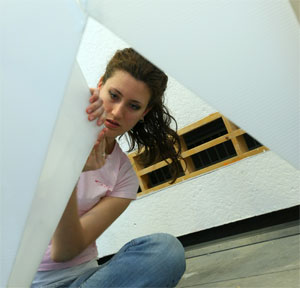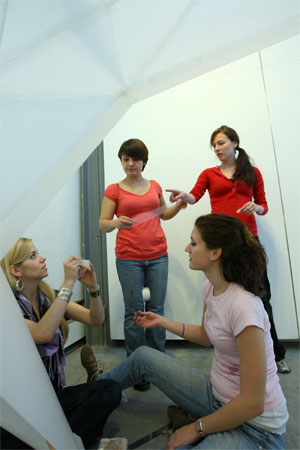 |
| Architecture student Kelly Minto. (Nick Pearce Photo) |
Every student jokes about burning homework at the end of the year, but it is not common for a professor to be there encouraging and even helping students to destroy their assignments. Nevertheless, that is just what was happening at Dalhousie University’s Medjuck Architecture building not too long ago.
After three days in an intensive structure workshop, pulling all-nighters to build perfect long-span structures from scratch, Professor Steven Mannell had his B3 (fourth year) architecture students spend an afternoon showing him how they would rip their hard work down.
The idea, however, was not just to let the students get their frustration out or to celebrate finishing a difficult task. It was also a learning experience. “Often, in structures,” said Professor Mannell, “the way you learn is in failure.” Simply to build something is not enough; you have to know how and why it will break. Besides, he noted, it keeps the students from sitting around thinking about the last minute tweaking they could have done to improve the final product.
The students were to watch each other destroy the various models and shapes so that they could learn about each different type of structure. Some would put weights on top. Some would take the bottom out from underneath. Even ideas involving water balloons were tossed around. Many different ways of annihilating their hours of hard work were discussed and perfected. In the end, though, whatever method of destruction they chose, their masterpieces would be destroyed.
 |
| The students worked in teams to create structures and tear them down. In this photo, Tanya Watson, Sumera Pepic, Shallyn Murray and Kelly Minto. (Nick Pearce Photo) |
The assignment was to create a large model of a structure that could be used for a community theatre. At a 1:5 scale, the structures were around the same height as the average student, making them much larger than the 1:20 scale small models architecture students usually work with.
“This is the first [model] we’ve done at this scale,” said student Megan Carroll, “we were basically just fiddling with it until we got it right.” In teams of eight, the students were told to choose a shape, materials, methods of building and task-delegation, and a prime way to tear the thing down at the end. Working mainly from pictures and past experience with the smaller models, it was not easy – the students were given minimal guidance in making their choices, expected to make discoveries for themselves.
Ralph Waldo Emerson once said that “men succeed when they realize that their failures are the preparation for their victories.” And that’s what this assignment was all about. To best learn about the structures, they had to learn from their mistakes.
